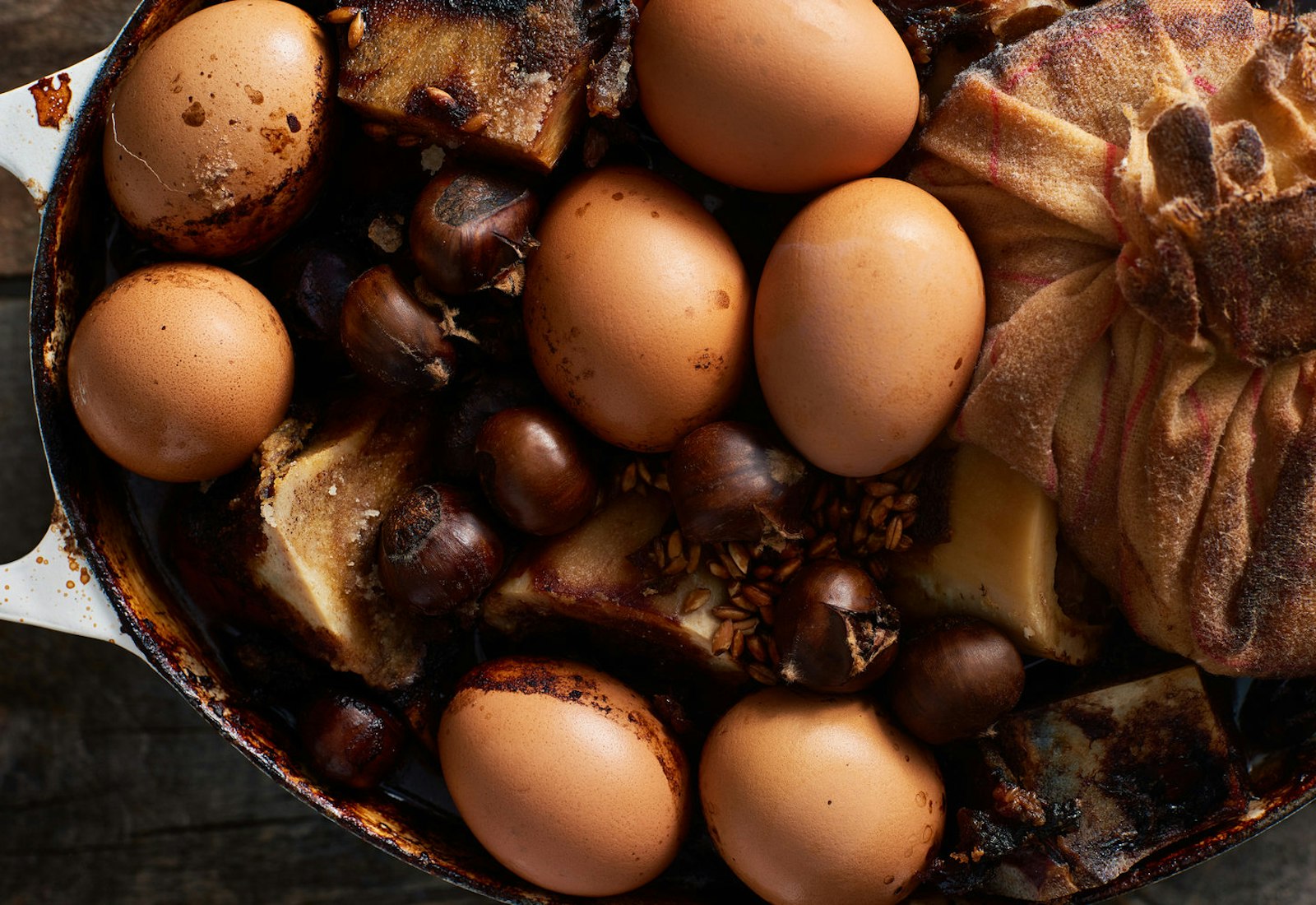Shared by Tziona Abramov


This recipe was shared by Tziona Abramov. Read more about her family in "A 9th Generation Jerusalem Family Shares Their Cholent Recipe."
Tziona’s family keeps everything else on the table light, because the cholent is so rich and satisfying. They typically serve beet salad (cooked and sliced thin with an onion, garlic, vinegar, and olive oil), green salad with citrus in a mustard lemon dressing, and either a tomato salad, radish and scallion salad, or green salad with mushrooms - depending on what they have on hand. To aid digestion, Tziona recommends serving a fruit compote with prunes at the end of the meal. After cholent a nap is common if not necessary!
Place the eggs in a single layer at the bottom of a large pot and cover with 1-2 inches of water. Bring water to a boil over high heat and cook until eggs are hard boiled, 10-12 minutes. Drain and set aside.
Preheat the oven to 250° and place the rack on the lowest position (making sure your chosen pot will fit).
Rinse the soaked beans and spread evenly along the bottom of the pot.
Place the beef, knee bone, bone marrow, and tendons (if using) on top of the beans. Wedge the potatoes in between the meat and bone marrow.
If using, place the kishke on top (if not browned, you can fry in a pan, 5 minutes per side)
In a small bowl, mix the rice with the oil and 1 teaspoon of salt, wrap in a piece of cheesecloth and tie with baker’s twine, leaving room for the rice to expand as it cooks. Nestle in the pot among the other ingredients.
Fill the pot with cold water, covering the ingredients and place on the stovetop over high heat. Bring to a boil, skimming off any foam that rises to the surface. Reduce the heat to low, add the two tablespoons of salt, and then sprinkle the barley over the top.
In a small, heavy-bottomed saucepan, heat the sugar over medium-high heat, until it melts and turns a rich amber color (be careful not to burn the sugar, once it has melted it can burn very quickly), about 3-5 minutes. Carefully drizzle the caramelized sugar into the simmering pot.
Place the eggs and the chestnuts (if using) on top and cover. Your pot will likely be so full that the top will barely fit. To ensure a good seal, take strips of aluminum foil and press around the edges of the pot.
Very carefully move the pot into the oven (it will be heavy!). The cholent should cook for around 12 hours depending on when you plan to serve it.
Early the next morning, when the wonderful smell wakes you up, check the ratio between the liquid and the ingredients and adjust the temperature of the oven if necessary. Continue checking every hour or so until you are ready to serve. There is a delicate balance that you are trying to strike between the temperature of your oven, the ratio of liquid to ingredients in your pot, and the time that you plan to serve the cholent. Ideally, the cholent is ready when all of the liquid has been absorbed by the ingredients. If there is too much liquid you may consider turning up the heat by a little or removing the lid. If there is too little, you may need to turn the heat down or in some rare instances add a touch more water. It’s ok if there is some liquid leftover in the pot at the very end - it happens sometimes.
For serving: place the eggs (peeled if you are very generous to your guests), chestnuts, and rice (removed from the cloth) in separate bowls and dig in, each person assembling their own bowl of ingredients.